Strictly Personal
Peter Obi: Time to destroy this Temple by Lasisi Olagunju
Published
2 years agoon

There is a trending video of a senile Paul Biya, President of Cameroon, at the just concluded US-Africa Leaders Summit in Washington, DC. He is called to deliver his speech after President Paul Kagame of Rwanda. He comes out, sits down and starts browsing aimlessly through a pamphlet he is holding. He mutters some words to no one in particular. Then he gets up….People who understand the French spoken in the video say the man acted and said things which showed that he was not aware of where he was and why he was there. Eighty-nine-year-old Biya marked 40 years in power last month. He became president of the Republic of Cameroon on November 6, 1982 and has seen the country and its fortune melt progressively like wax set on fire. The man is the country; his son is positioned to be the future. More than 90 percent of Cameroon’s almost 25 million people have known no other president in their entire lives apart from Biya. They call him ‘father.’ You are likely to say Nigeria can never have a Biya who would sit tight here for 40 years. You may be right – and you will be wrong at the same time. Look at those very old men seeking to be our president in 2023. None of them will win and spend forty years on the throne – merciful nature will take care of that for us. But imagine one of the old men, if he wins, and he wills it, subsequently deciding to buy the throne for his thirty-something-year-old son. We will gladly sell out to him because we are always willing to sell. And, if the son is smarter than the dad, he will be there and get our lawmakers to amend the constitution, and buy power from us for himself and his descendants forever. We have enough foolishness, and madness, and the potential – and the structure- to make that happen.
There will be a Biya in Nigeria unless we demolish and reconstruct Nigeria’s house of abuse. Nigeria’s Labour Party’s presidential candidate, Peter Obi, said that much in Akwa Ibom last week: “The structure they have today is what we want to dismantle. It is a structure of criminality,” he lashed out at the establishment people who have forever held the knife and the yam of Nigeria. The big men, especially Obi’s opponents, taunt him repeatedly that he ‘lacks structure’ to translate his mass appeal and mass following to electoral success in the coming poll. And for them, he had bad news. He said the structure his opponents gloated about “is the structure that produced 133 million people living in poverty, 20 million out-of-school children, and made Nigeria surpass India in infant mortality. It is the structure that destroys us; we want to destroy that structure.” He spoke well, very well – the best words he has uttered since the beginning of this contest. There is no doubt about it that the killer-structure deserves to go if we must save ourselves and the country.
Ask computer engineers what to do to fix a bad system. They will tell you that the first fix is to restart your computer. Sometimes restarting demands force. “If it isn’t responding, and you can’t turn it off, then on, try forcing it to restart.” That is the advice from the makers of iPhones. They say so because they are wise. The sensible thing to do when a country is failing, or has failed, is to rework the structure, the parts, including the expansion joints. The pernicious Nigerian structure, if it survives the 2023 elections, will produce more than what Obi said. It will produce leaders worse than Biya – he has a senior, Teodoro Obiang Nguema Mbasogo, the president of Equatorial Guinea; that one has been in power since 1979. How long should an era last? His son is also the heir there. We do not yet have a Biya or an Mbasogo family gnawing at our guts but we have a ruling caste feasting on the heart of the system. They’ve narrowed the route to survival and they man the gates. And it will get worse. So, how do we escape that which is coming? Obi B. Egbuna was a Nigerian novelist, short story writer and playwright. He once wrote that “one way to destroy a people is to allow only the fools to survive.” And who is a fool? Plato has a definition: the one who revels in malicious pleasure. Plato’s teacher, Socrates held that mankind is made up of two kinds of people: wise people who know they’re fools, and fools who think they are wise – we have them as leaders and followers; both have a role to play in the coming contest for the soul of Nigeria.
One of Obi Egbuna’s most popular works is ‘Destroy this Temple’, a book about defiance and decisiveness against decay. I believe he took that book title from the Bible where Jesus Christ saw an abuse of structure and moved against it. Yesterday was Christmas, the festival of celebrations of Jesus’s birth. How many of those who sang and danced in celebration yesterday live their lives like Christ who left here over 2,000 years ago? He was calm and gentle but there was a lone incident where he lost his cool and went physical against abusers of privileges. The Bible has that instructive story that fits this narrative about breaking down and rebuilding a bad system. Men of advantage had ‘abducted’ the space of the Temple in Jerusalem and turned it into “a den of thieves” and “a house of trade” – a structure for sleaze and greed and hightailed loots of the ruling class. Jesus saw it but didn’t just whine and leave. With whip, he expelled the merchants and the money changers. “And Jesus entered the temple and drove out all those who were buying and selling in the temple, and overturned the tables of the money changers and the seats of those who were selling doves” (Mathew 21:12). Bible scholars call this story the cleansing of the Temple narrative. We need a reenactment of this rite in Nigeria. The Nigerian nation is like that Biblical Temple; it has become a haven for bandits and a place of refuge for ‘money changers’ to hold court.
The lesson from the temple story here is that there is no system that cannot be corrupted if the people it serves go to sleep. At the core of that temple incident was money and its corruptive influences. In ‘The Challenge and Spirituality of Catholic Social Teaching’, Marvin L. Mich Krier quotes William Herzog, author of ‘Parables as Subversive Speech’ as arguing that “the Temple cleansing cannot be divorced from the role of the Temple as a bank.” Criminals used “the temple’s outer court to change impure foreign money to temple coins for purchasing sacrificial animals” (Jack Hartjes, 2022). Krier proceeds to further give a scholarly insight into the political economic significance of the Jewish Temple: “In the time of Jesus, the Temple amassed great wealth because of the half-shekel temple tax assessed on each male. Historical evidence supports the fact that large amounts of money were stored in the temple. The temple then was able to make loans on behalf of the wealthy elite to the poor. If the poor were not able to pay their loans, they would lose their land. ‘The temple was, therefore, at the very heart of the system of economic exploitation made possible by monetizing the economy and the concentration of wealth made possible by investing the temple and its leaders with the powers and rewards of a collaborating aristocracy.’ As evidence of this role of temple funds, Herzog notes, ‘it was no accident that one of the first acts of the First Jewish Revolt in 66 C.E. was the burning of debt records in the archives in Jerusalem’ ” (Marvin Krier: 2011).
Just like the Temple in Jerusalem, Nigeria, built with the sweat and blood of all, has become some people’s business empire. It has become a country of public debts for all and private wealth for a select few. The year 2023 is one of decision and desperation. And it is just one blurry week away. We have old presidential candidates, fading and very desperate – because it is their last battle. We have third-force candidates backed by a very desperate youth population, and hordes of the angry poor who talk about taking back their lives from a plundering political elite. What is going to happen? When I heard one of them, Peter Obi, speak in Akwa Ibom with a promise to destroy the structure that has made a fool of honesty in Nigeria, I asked how he was going to do it. Peter Obi told the Nigerian youths: “…you are the next structure. We want to build a better place for our children.” The man obviously has a heart of gold but that is where it ends. Even if he wins, his win will reinforce the pillars of the structure he spoke of destroying. He will be sucked in and initiated fully into the sacred grove of the principalities. So, I think the ultimate solution is the destruction of Nigeria’s faithless temple – using the law. Nigeria is too defective to work. We must employ the law to destroy the temple and create our own “three days” to rebuild it. We need a new temple of justice and fairness to live normal lives.
There are, of course, consequences; every act of cleansing has. Those who inherited the odious structure of Nigeria have a duty to keep it for their descendants even if the country’s 200 million people have to go down in the process. The noose is tightening as the darkness lengthens. The options are not pleasant and are not many. Protests and protestations will amount to nothing in the new year. One of the big presidential candidates told us last week. But good people everywhere must not keep quiet – and must resist being silenced by those who think they alone have a voice. At the same time, we should know that he who chooses to pray for the street madman must not close his eyes. And if you are moving against insanity, your footfall must wear shoes of silence at all times. The world has always been a dangerous place to practise iconoclasm. David Landry, a professor in Theology at the University of St. Thomas, United States, is quoted variously by other scholars as pointing out to us that “within a week” of Jesus fighting the principalities in the Temple, he was dead. Landry cites the disciples, Matthew, Mark, and Luke as agreeing that the Temple cleansing event “functioned as the ‘trigger’ for Jesus’s death.” Krier also tells of these consequences. He points at the book of Mark where Jesus accused the merchants of making the Temple a den of robbers: “And when the chief priests and the scribes heard it, they kept looking for a way to kill him.” Nigeria will not kill us.
Merry Christmas and a Happy 2023.
You may like
-
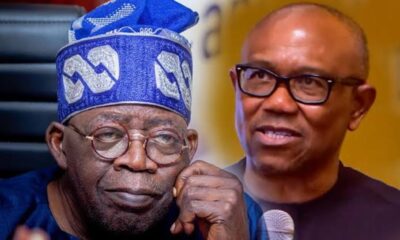

Hardship under Tinubu is fuelling mental health issues, suicide in Nigeria— Peter Obi
-
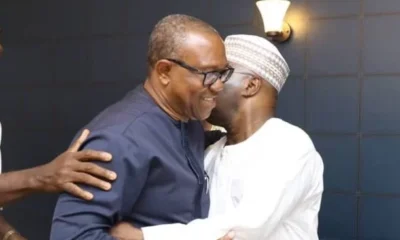

Nigeria 2027: Opposition party chieftain Atiku vows to support Obi if …
-
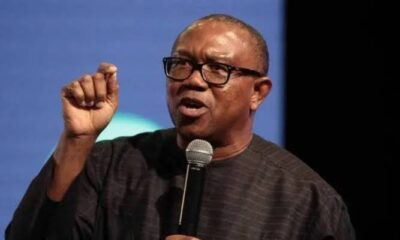

Nigeria has no reason being a poor country, Peter Obi says
-
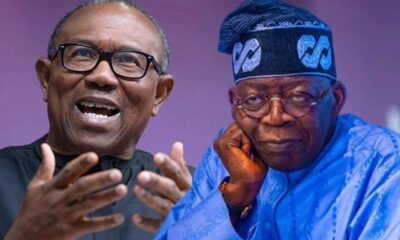

Nigeria: Peter Obi cautions Tinubu against excessive borrowings, tells him to account for past loans
-
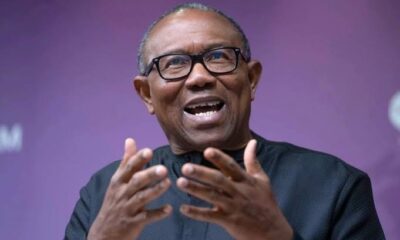

Ukraine’s donation of food aid to Nigeria a national disgrace— Peter Obi
-
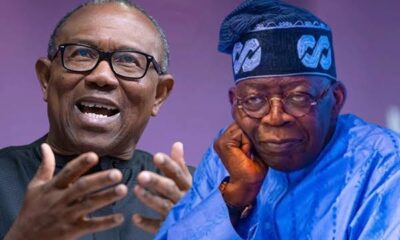

Travel entourage reduction not enough, Obi tells Tinubu
Strictly Personal
Let’s merge EAC and Igad, By Nuur Mohamud Sheekh
Published
2 months agoon
November 27, 2024
In an era of political and economic uncertainty, global crises and diminishing donor contributions, Africa’s regional economic communities (RECs) must reimagine their approach to regional integration.
The East African Community (EAC) and the Intergovernmental Authority on Development (Igad), two critical RECs in East Africa and the Horn of Africa have an unprecedented opportunity to join forces, leveraging their respective strengths to drive sustainable peace and development and advance regional economic integration and promote the African Continental Free Trade Area (AfCFTA).
Already, four of the eight Igad member states are also members of the EAC and, with Ethiopia and Sudan showing interest, the new unified bloc would be formidable.
Igad’s strength lies in regional peacemaking, preventive diplomacy, security, and resilience, especially in a region plagued by protracted conflicts, climate challenges, and humanitarian crises. The EAC, on the other hand, has made remarkable strides in economic integration, exemplified by its Customs Union, Common Market, and ongoing efforts toward a monetary union. Combining these comparative advantages would create a formidable entity capable of addressing complex challenges holistically.
Imagine a REC that pairs Igad’s conflict resolution strengths with the EAC’s diplomatic standing and robust economic framework. Member states of both are also contributing troops to peacekeeping missions. Such a fusion would streamline efforts to create a peaceful and economically prosperous region, addressing the root causes of instability while simultaneously promoting trade investment and regional cooperation.
These strengths will be harnessed to deal with inter-state tensions that we are currently witnessing, including between Ethiopia and Somalia over the Somaliland MoU, strained relations between Djibouti and Eritrea, and the continually deteriorating relations between Eritrea and Ethiopia.
The global economy experienced as a result of the COVID-19 pandemic, compounded by the Ukraine war and competing global crises, has strained donor countries and reduced financial contributions to multilateral organisations and African RECs. Member states, many of which are grappling with fiscal constraints, are increasingly unable to fill this gap, failing to make timely contributions, which is in turn affecting key mandate areas of Igad and EAC, and staff morale.
A merger between Igad and EAC would alleviate this financial pressure by eliminating redundancies. Shared administrative systems, integrated programmes, and a unified leadership structure would optimise resources, enabling the new REC to achieve more with less. Staff rationalisation, while sensitive, is a necessary step to ensure that limited funds are channelled toward impactful initiatives rather than duplicative overheads.
The African Union (AU) envisions a fully integrated Africa, with RECs serving as the building blocks of the AfCFTA. A unified EAC-Igad entity would become a powerhouse for regional integration, unlocking economies of scale and harmonising policies across a wider geographical and economic landscape.
This merger would enhance the implementation of the AfCFTA by creating a larger, more cohesive market that attracts investment, fosters innovation, and increases competitiveness. By aligning trade policies, infrastructure projects, and regulatory frameworks, the new REC could serve as a model for others, accelerating continental integration.
The road to integration is not without obstacles. Political will, divergent institutional mandates, and the complexity of harmonising systems pose significant challenges. However, these hurdles are surmountable through inclusive dialogue, strong leadership, and a phased approach to integration.
Member states must prioritise the long-term benefits of unity over short-term political considerations. Civil society, the private sector, the youth, and international partners also have a critical role to play in advocating for and supporting this transformative initiative.
The time for EAC and Igad to join forces is now. By merging into a single REC, they would pool their strengths, optimise resources, and position themselves as a driving force for regional and continental integration. In doing so, they would not only secure a prosperous future for their citizens and member states but also advance the broader vision of an integrated and thriving Africa.
As the world grapples with crises, Africa must look inward, embracing the power of unity to achieve its potential. A combined Igad-EAC is the bold step forward that the continent needs.
Nuur Mohamud Sheekh, a diplomatic and geopolitical analyst based in London, is a former spokesperson of the Igad Executive Secretary. X: @NuursViews
Strictly Personal
Budgets, budgeting and budget financing, By Sheriffdeen A. Tella, Ph.D.
Published
2 months agoon
November 20, 2024
The budget season is here again. It is an institutional and desirable annual ritual. Revenue collection and spending at the federal, State and local government levels must be authorised and guided by law. That is what budget is all about. A document containing the estimates of projected revenues from identified sources and the proposed expenditure for different sectors in the appropriate level of government. The last two weeks have seen the delivery of budget drafts to various Houses of Assembly and the promise that the federal government would present its draft budget to the National Assembly.
Do people still look forward to the budget presentation and the contents therein? I am not sure. Citizens have realised that these days, governments often spend money without reference to the approved budget. A governor can just wake up and direct that a police station be built in a location. With no allocation in the budget, the station will be completed in three months. The President can direct from his bathroom that 72 trailers of maize be distributed to the 36 states as palliatives. No budget provision, and no discussion by relevant committee or group.
We still operate with the military mentality. We operated too long under the military and of the five Presidents we have in this democracy, two of them were retired military Heads of State. Between them, they spent 16 years of 25 years of democratic governance. Hopefully, we are done with them physically but not mentally. Most present governors grew up largely under military regimes with the command system. That is why some see themselves as emperor and act accordingly. Their direct staff and commissioners are “Yes” men and women. There is need for disorientation.
The importance of budget in the art of governance cannot be overemphasized. It is one of the major functions of the legislature because without the consideration and authorisation of spending of funds by this arm of government, the executive has no power to start spending money. There is what we refer to as a budget cycle or stages. The budget drafting stage within the purview of the executive arm is the first stage and, followed by the authorisation stage where the legislature discusses, evaluates and tinkers with the draft for approval before presenting it to the President for his signature.
Thereafter, the budget enters the execution phase or cycle where programmes and projects are executed by the executive arm with the legislature carrying out oversight functions. Finally, we enter the auditing phase when the federal and State Auditors verify and report on the execution of the budgets. The report would normally be submitted to the Legislature. Many Auditor Generals have fallen victim at this stage for daring to query the executives on some aspects of the execution in their reports.
A new budget should contain the objectives and achievements of the preceding budget in the introduction as the foundation for the budget. More appropriately, a current budget derives its strength from a medium-term framework which also derives its strength from a national Development Plan or a State Plan. An approved National Plan does not exist currently, although the Plan launched by the Muhammadu Buhari administration is in the cooler. President Tinubu, who is acclaimed to be the architect of the Lagos State long-term Plan seems curiously, disillusioned with a national Plan.
Some States like Oyo and Kaduna, have long-term Plans that serve as the source of their annual budgets. Economists and policymakers see development plans as instruments of salvation for developing countries. Mike Obadan, the former Director General of the moribund Nigeria Centre for Economic and Management Administration, opined that a Plan in a developing country serves as an instrument to eradicate poverty, achieve high rates of economic growth and promote economic and social development.
The Nigerian development plans were on course until the adoption of the World Bank/IMF-inspired Structural Adjustment Programme in 1986 when the country and others that adopted the programme were forced to abandon such plan for short-term stabilisation policies in the name of a rolling plan. We have been rolling in the mud since that time. One is not surprised that the Tinubu administration is not looking at the Buhari Development Plan since the government is World Bank/IMF compliant. It was in the news last week that our President is an American asset and by extension, Nigeria’s policies must be defined by America which controls the Bretton Woods institutions.
A national Plan allows the citizens to monitor quantitatively, the projects and programmes being executed or to be executed by the government through the budgeting procedure. It is part of the definitive measures of transparency and accountability which most Nigerian governments do not cherish. So, you cannot pin your government down to anything.
Budgets these days hardly contain budget performance in terms of revenue, expenditure and other achievements like several schools, hospitals, small-scale enterprises, etc, that the government got involved in successfully and partially. These are the foundation for a new budget like items brought forward in accounting documents. The new budget should state the new reforms or transformations that would be taking place. Reforms like shifting from dominance of recurrent expenditure to capital expenditure; moving from the provision of basic needs programmes to industrialisation, and from reliance on foreign loans to dependence on domestic fund mobilisation for executing the budget.
That brings us to the issue of budget deficit and borrowing. When an economy is in recession, expansionary fiscal policy is recommended. That is, the government will need to spend more than it receives to pump prime the economy. If this is taken, Nigeria has always had a deficit budget, implying that we are always in economic recession. The fact is that even when we had a surplus in our balance of payment that made it possible to pay off our debts, we still had a deficit budget. We are so used to borrowing at the national level that stopping it will look like the collapse of the Nigerian state. The States have also followed the trend. Ordinarily, since States are largely dependent on the federal government for funds, they should promote balanced budget.
The States are like a schoolboy who depends on his parents for school fees and feeding allowance but goes about borrowing from classmates. Definitely, it is the parents that will surely pay the debt. The debt forgiveness mentality plays a major role in the process. Having enjoyed debt forgiveness in the past, the federal government is always in the credit market and does not caution the State governments in participating in the market. Our Presidents don’t feel ashamed when they are begging for debt forgiveness in international forum where issues on global development are being discussed. Not less than twice I have watched the countenance of some Presidents, even from Africa, while they looked at our president with disdain when issues of debt forgiveness for African countries was raised.
In most cases, the government, both at the federal and state cannot show the product of loans, except those lent by institutions like the World Bank or African Development Bank for specific projects which are monitored by the lending institutions. In other cases, the loans are stolen and transferred abroad while we are paying the loans. In some other cases, the loans are diverted to projects other than what the proposal stated. There was a case of loans obtained based on establishing an international car park in the border of the State but diverted to finance the election of a politician in the State. The politician eventually lost the election but the citizens of the State have to be taxed to pay the loan. Somebody as “Nigeria we hail thee”.
Transformation in budgeting should commence subsequently at the State and federal level. Now that local government will enjoy some financial autonomy and therefore budgeting process, they should be legally barred from contracting foreign loans. They have no business participating in the market. They should promote balanced budget where proposed expenditures must equal the expected revenues from federal and internal sources. The State government that cannot mobilise, from records, up to 40 percent of its total budget from IGR should not be supported to contract foreign loans. The States should engage in a balanced budget. The federal government budget should shift away from huge allocations to recurrent expenditure towards capital expenditure for capital formation and within the context of a welfarist state.
Sheriffdeen A. Tella, Ph.D.
EDITOR’S PICK


Nigeria: Marketers predict further price cut as another refinery begins operations
Oil marketers and the Nigerian Midstream and Downstream Petroleum Regulatory Authority expect refined petroleum product prices to reduce as another...


Kenya: Consumer inflation rises to 3.0% from 2.8%
Kenya’s statistics agency said on Tuesday that Kenya’s consumer price inflation increased slightly to 3.0% year-over-year in December from 2.8%...


South Africa’s Transnet’s half-year deficit hits $117m
Transnet, a state-owned logistics company in South Africa, announced on Tuesday that it had lost 2.2 billion rand ($117.48 million)...


Nigeria, China extend $2bn currency swap deal
A 15 billion yuan ($2 billion) currency-swap arrangement between China and Nigeria has been extended to boost investment and commerce...


Egypt’s central bank maintains overnight rates
As anticipated, Egypt’s central bank has maintained its overnight interest rates, stating that although inflation was predicted to drop significantly...


Illicit flows cost Nigeria, others $1.6bn daily— AfDB
According to the African Development Bank (AfDB), illicit money flows and profit shifting by multinational corporations doing business in Africa...


‘Don’t start what you can’t finish’, ex-Nigerian official replies President Tchiani
Former Nigerian Aviation Minister, Femi Fani-Kayode, has told President Abdourahamane Tchiani of Niger Republic to refrain from making infantile and...


Again, Starlink raises prices of its services in Nigeria
Elon Musk’s satellite internet service provider, Starlink, has again jacked up the prices of its services in Nigeria after an...


Former President of Moroccan club Raja sentenced to 3 years in prison
The former President of Moroccan top club, Raja Casablanca, Mohamed Aouzal, has been sentenced to three and a half years...


Zambia announces second case of Mpox as country battles cholera outbreak
The Zambian Ministry of Health has reported a second case of Monkeypox, popularly known as Mpox, in Kitwe region of...


